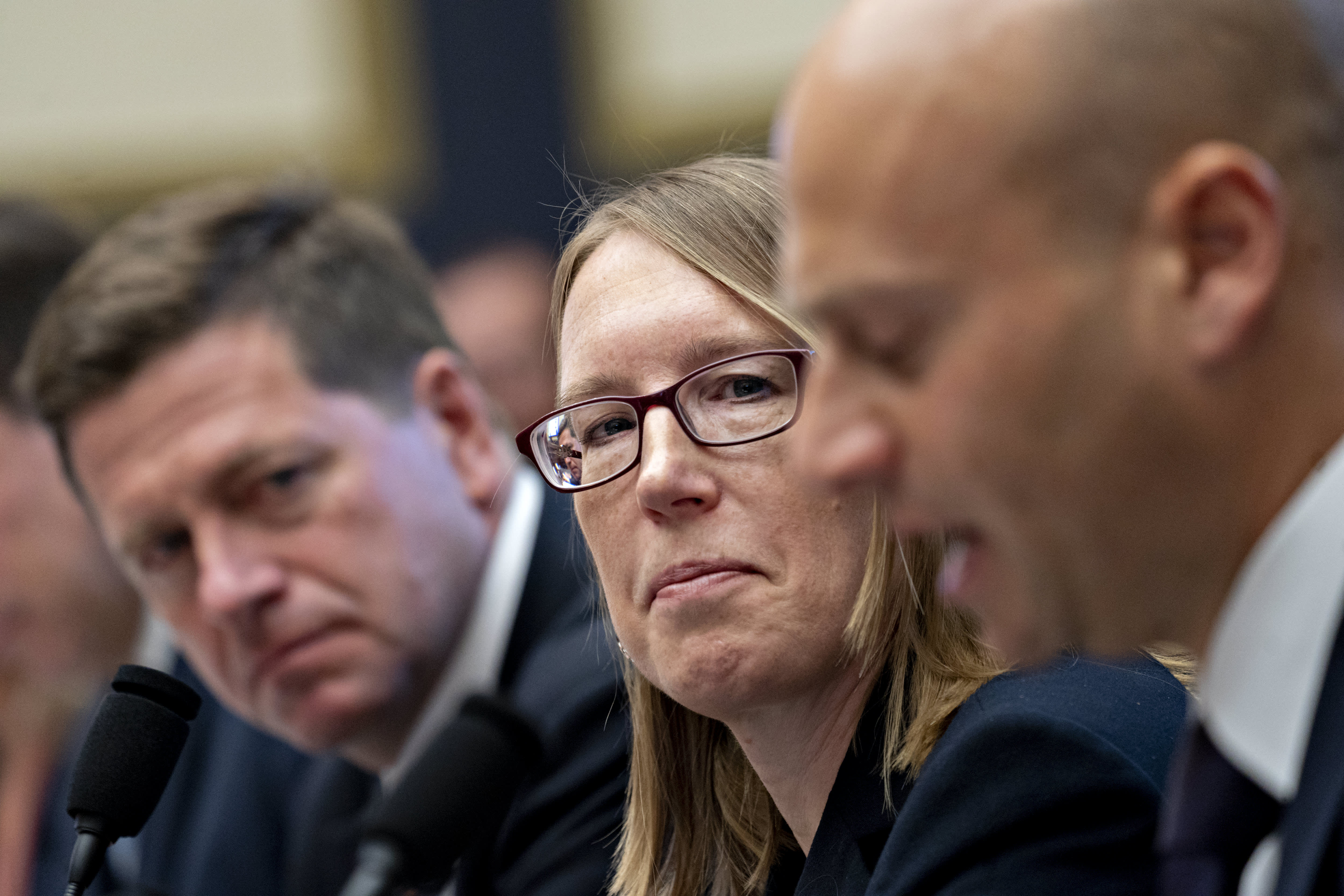
Hester Peirce, commissioner of the U.S. Securities and Exchange Commission (SEC), center, listens during a House Financial Services Committee hearing in Washington, D.C., U.S., on Tuesday, Sept. 24, 2019.
Andrew Harrer | Bloomberg | Getty Images
Hester Peirce is perplexed.
For years, the Securities and Exchange Commission, of which Peirce is a member, has denied applications by the nation’s exchanges and financial firms to list securities that track the performance of popular digital currency bitcoin.
Earlier — say, 10 years ago — concerns about potential market manipulation and liquidity may have made sense, but things have changed.
“That is the probably the biggest, the most-often-asked question that I get: When will the SEC approve a bitcoin exchange-traded product?” Commissioner Peirce said in an interview with CNBC on Thursday.
“I thought that if we had applied our standards as we have applied them to other products, we would already have approved one or more of them,” she said. “With each passing day, the rationale that we have used in the past for not approving seems to grow weaker.”
The SEC applies a “unique, heightened standard” to filings related to digital assets, she wrote in 2020. And she has argued that the agency is asking exchanges and would-be ETF sponsors for assurances beyond what it asks for traditional, equity-based products.
“People of a regulatory mindset, when they encounter something new like this, say, ‘Oh, wait a minute: The market for bitcoin looks a bit different than the markets we’re used to,'” Peirce said Thursday.
Now, she added, the bitcoin market looks more like an established market that has more participation from institutional and mainstream retail investors.
“So, I think the markets have matured quite a bit,” Peirce said.
Renewed calls for an SEC-approved bitcoin ETF come just weeks after the regulator said it would again delay its decision on whether to approve an application by VanEck to list shares of its Bitcoin Trust on the Chicago Board of Exchange’s BTZ Exchange.
Regulators said in a letter dated June 16 that they would take additional time to seek comments from the public. Specifically, the SEC is asking investors and academics for their opinions on whether bitcoin ETFs could be vulnerable to manipulation, or whether bitcoin itself is sufficiently dispersed and therefore resistant to similar underhanded tampering.
But Peirce, a Republican appointed as one of the SEC’s five commissioners by former President Donald Trump, has long decried what she sees as a double standard at her own agency when it comes to bitcoin products.
Perhaps her most pointed objection came in a 2018 dissent, when she argued that the SEC should have approved an application filed by the Chicago Board of Exchange’s Bats BTZ Exchange to list and trade shares of the Winklevoss Bitcoin Trust.
“By precluding approval of cryptocurrency-based ETPs for the foreseeable future, the Commission is engaging in merit regulation,” she wrote at the time. “Bitcoin is a new phenomenon, and its long-term viability is uncertain. It may succeed; it may fail. The Commission, however, is not well positioned to assess the likelihood of either outcome, for bitcoin or any other asset.”
Three years later, the current VanEck filing — similar to pending bitcoin ETF applications from Fidelity, Cathie Wood’s Ark Invest, and several others — is viewed by the industry as a litmus test of an SEC now helmed by a cryptocurrency expert, Chairman Gary Gensler.
Former Commodity Futures Trading Commission Chairman Gary Gensler testifies at a U.S. Senate Banking Committee hearing on systemic risk and market oversight on Capitol Hill in Washington May 22, 2012.
Jonathan Ernst | Reuters
His nomination to lead the SEC by President Joe Biden, and his subsequent confirmation in the Senate, was met with optimism by many in the crypto community, as he is seen as a practiced hand in crafting novel financial rules.
Gensler, who has taught crypto courses at the Massachusetts Institute of Technology, is perhaps best known for his influential tenure as chair of the Commodity Futures Trading Commission in the Obama administration. While there, Gensler helped devise and institute a new oversight regime for the swaps market that had been largely unregulated prior to the financial crisis.
So, while Democrat Gensler may not necessarily agree with Trump-appointee Peirce in all matters, they may align in wanting a more proactive SEC when it comes to bitcoin regulation.
Denying bitcoin ETF applications not only runs the risk of a double standard but also may leave thousands of investors with few, more-dangerous alternatives.
“The complications of not approving [an application] become stronger, because people are looking for other ways to do the same kinds of things that they would do with an exchange-traded product,” she said. “They’re looking at other types of products that aren’t as easy to get in and out of, they’re looking at companies, perhaps, that are somehow connected with bitcoin or crypto more broadly.”
Bitcoin itself has suffered a violent start to the summer and has seen its price swoon more than 40% over the last three months. Though it remains one of the most actively traded digital assets, some market watchers say bitcoin is at a critical juncture.
“It looks like it may be getting ready for a retest of $30,000, and that could be critical,” UBS director of NYSE floor operations Art Cashin said on Thursday. “If you break the $30,000, then traders will look to see if there’s a trapdoor, cascade sell-off that follows.”
Its dizzying ups and downs come even as a growing number of businesses and banks, including payments companies Square and PayPal, have started to facilitate bitcoin transactions.
Meanwhile, Bank of New York Mellon said in February that it will begin financing bitcoin, a key development as it is both the nation’s oldest bank and a leader in custody banking.
As of late Friday morning, bitcoin was up 1.6% around $33,550.
Despite the currency’s volatile price swings, Peirce remains convinced that a bitcoin ETF is overdue.
It’s not the SEC’s job to approve or reject applications based on the merits of the investment itself, she said Thursday, especially if exchanges are meeting statutory requirements for protecting investors from fraud.
“Bitcoin now is so decentralized. The number of nodes that are involved in Bitcoin is large, and the number of people who have an interest in keeping that work decentralized is very large,” she said. “People should make their own decisions: If people don’t want to buy bitcoin because they think it’s manipulated, they shouldn’t buy bitcoin.”
from WordPress https://ift.tt/3ygJVum
via IFTTT

No comments:
Post a Comment